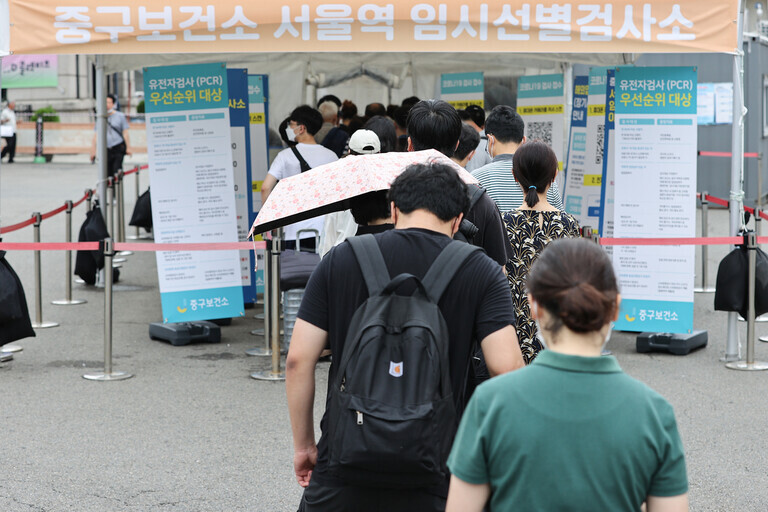hankyoreh
Links to other country sites 다른 나라 사이트 링크
Cumulative COVID-19 cases in S. Korea surpass 20M

Amid an ongoing resurgence in COVID-19 infections, South Korea’s cumulative total of confirmed cases passed the 20-million mark Tuesday.
The milestone, which came two years and seven months after the first patient was diagnosed in South Korea, means that approximately 2 out of every 5 people in South Korea have tested positive for COVID-19.
On Tuesday, Yonhap News reported that between 12:01 am and 9 pm that day, a total of 115,311 people had tested positive for COVID-19 in South Korea’s 17 metropolitan cities and provinces. Compared with the 97,617 new confirmed cases recorded as of 9 pm a week earlier on July 26, the number was approximately 1.18 times higher (17,694 more cases).
Earlier that day, the Central Disease Control Headquarters (CDCH) of the Korea Disease Control and Prevention Agency announced that 111,789 new confirmed cases had been counted as of the end of the day Monday. That brought the cumulative total of confirmed cases to 19,932,439.
The additional 115,311 cases counted as of 9 pm Tuesday put the cumulative total past 20 million. This came two years, six months, and 13 days after the first COVID-19 case was confirmed in South Korea on Jan. 20, 2020.
With the cumulative total passing 10 million for the first time on March 22, the number has taken an additional 133 days to double to 20 million. This means that over 38% of South Korea’s population — with 51,638,809 total residents registered as of 2021 — has been confirmed infected with COVID-19 at least once.
The figure shared by Yonhap as of 9 pm Tuesday was a provisional number. The CDCH finished counting new cases at midnight, with the exact final total announced Wednesday morning reaching 119,922.
In a social media post the same day, Jung Jae-hun, a professor of preventive medicine at Gachon University and member of the national pandemic crisis response advisory committee, said, “We’re predicting that the resurgence will pass its peak between this week and next week.”
“The surge appears likely to be less than half as big as originally predicted,” he added.
On July 19, Jung had predicted that South Korea could see as many as 250,000 new confirmed cases daily by around Aug. 20. Based on a new prediction from July 29, the resurgence instead appears likely to peak at a little over 100,000 daily confirmed cases around Sunday, Aug. 7.
Analysts are attributing the lower numbers to people retaining their immunity after being previously infected during the Omicron surge of February to April, a low reinfection rate in the range of 5 to 6 percent, and a higher-than-expected rate of fourth vaccine dose uptake among members of high-risk groups.
Jung also said there was little likelihood of the so-called "Centaurus" (BA.2.75) subvariant suddenly displacing BA.5 to become the dominant strain.
“Based on the overseas data, it does not appear that this subvariant is going to suddenly supplant BA.5,” he said.
“Another surge is inevitable,” he also predicted, adding that “a surge caused by a different variant could begin as early as this November.”
The CDCH said Tuesday that BA.5 had become the dominant variant in South Korea, accounting for 60.95% of domestic infections during the fourth week of July.
By Lim Jae-hee, staff reporter
Please direct questions or comments to [english@hani.co.kr]

Editorial・opinion
![[Column] Season 2 of special prosecutor probe may be coming to Korea soon [Column] Season 2 of special prosecutor probe may be coming to Korea soon](https://flexible.img.hani.co.kr/flexible/normal/500/300/imgdb/original/2024/0426/3317141030699447.jpg) [Column] Season 2 of special prosecutor probe may be coming to Korea soon
[Column] Season 2 of special prosecutor probe may be coming to Korea soon![[Column] Park Geun-hye déjà vu in Yoon Suk-yeol [Column] Park Geun-hye déjà vu in Yoon Suk-yeol](https://flexible.img.hani.co.kr/flexible/normal/500/300/imgdb/original/2024/0424/651713945113788.jpg) [Column] Park Geun-hye déjà vu in Yoon Suk-yeol
[Column] Park Geun-hye déjà vu in Yoon Suk-yeol- [Editorial] New weight of N. Korea’s nuclear threats makes dialogue all the more urgent
- [Guest essay] The real reason Korea’s new right wants to dub Rhee a founding father
- [Column] ‘Choson’: Is it time we start referring to N. Korea in its own terms?
- [Editorial] Japan’s rewriting of history with Korea has gone too far
- [Column] The president’s questionable capacity for dialogue
- [Column] Are chaebol firms just pizza pies for families to divvy up as they please?
- [Column] Has Korea, too, crossed the Rubicon on China?
- [Correspondent’s column] In Japan’s alliance with US, echoes of its past alliances with UK
Most viewed articles
- 1‘We must say no’: Seoul defense chief on Korean, USFK involvement in hypothetical Taiwan crisis
- 2AI is catching up with humans at a ‘shocking’ rate
- 3The dream K-drama boyfriend stealing hearts and screens in Japan
- 4[Column] Can we finally put to bed the theory that Sewol ferry crashed into a submarine?
- 5S. Korea “monitoring developments” after report of secret Chinese police station in Seoul
- 6[Editorial] Yoon cries wolf of political attacks amid criticism over Tokyo summit
- 7Doubts remain over whether Yoon will get his money out of trip to Japan
- 8[Photo] “Comfort woman” survivor calls on president to fulfill promises
- 9[Editorial] Was justice served in acquittal of Samsung’s Lee Jae-yong?
- 101 in 5 unwed Korean women want child-free life, study shows